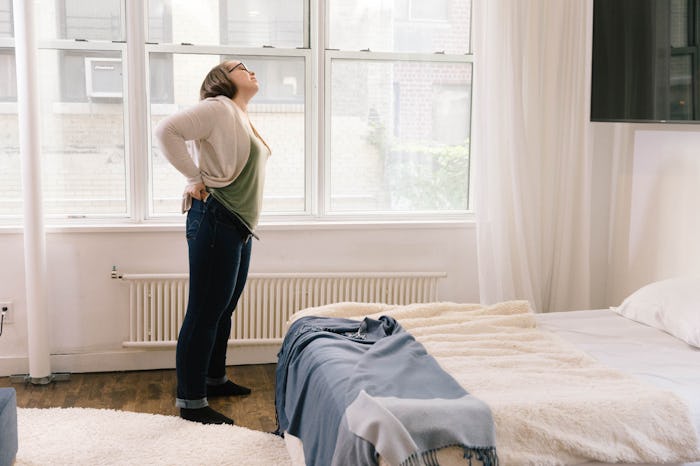Life
6 Things Nobody Told You About Your Back During Pregnancy
You may have imagined that when you get pregnant, your life would be filled with butterflies and roses because all those pregnant celebrities sure make it look that way. But underneath all the contouring, designer maternity wear, and dark sunglasses, even the biggest superstars are suffering from the aches and pains of pregnancy. One of the most common ailments, as harmless as it may seem, is pregnancy back pain. Many women may tell you about how wonderful their experience was, but there are things no one tells you about your back during pregnancy, and you need to be prepared.
Just like the changes in the rest of your body, your back is also facing its own pregnancy changes. The most notable back changes develop into back pain, and if you have been suffering from it, you're not alone. In an interview with Romper, Dr. Adrienne Zertuche, OB-GYN at Atlanta Women's Healthcare Specialists, says that lower back pain is a common problem among pregnant women, with some studies reporting its prevalence in more than 60 percent of pregnancies. She says that because back pain can be caused by a number of reasons, if you suffer from back pain, it’s important for you to monitor your symptoms and report any concerns to your obstetrician.
Your back has a hard job and that job gets tougher with pregnancy. Your growing belly and weight can put a lot of stress on your back muscles and nerves. Luckily, when your baby arrives, your back won’t have to work as hard, easing up on any discomfort. In the meantime, here are a few things that can happen to your back during pregnancy.
1You Could Develop Sciatica
Probably one of the worst types of pregnancy back pains is sciatica. Dr. Mary O’Toole, OB-GYN at Memorial Saddleback Medical Center, tells Romper that as your baby grows and your uterus enlarges, there can be extra pressure on your back region, pressing down on your sciatic nerves. She says that with sciatica, you may feel the sensation of an electric shock type pain shooting from your lower back down the back of your legs. O’Toole suggests trying massage, a heating pad, chiropractors, or even acupuncture if you suffer from sciatica. Luckily, says O’Toole, there should be no long term effects from sciatic pain, so it should subside after delivery.
2Your Posture May Change
With the weight of your growing belly and breasts, your body may begin to hunch over, explained the American Pregnancy Association (APA), and actually shift your center of gravity. Dr. Elizabeth West, OB-GYN at Miller Children’s and Women’s Hospital, tells Romper that during the second trimester, the pressure of the growing pregnancy could actually change the curvature of your spine. “Pregnant woman can develop a change in posture, called lordosis,” she explains, “which is an inward curvature of the spine that helps to compensate for a growing belly.” West says that this change in posture can cause considerable strain and back pain. The APA suggested that if this is the case, you should probably avoid wearing high heels and try wearing an abdominal support belt to help support your posture.
3Back Pain Could Be A Sign Of Labor
Unfortunately back pain can also be the sign of preterm labor. O’Toole says that if you start to feel intense lower back cramping followed by abdominal or pelvic discomfort, you could be going into labor prematurely. She warns that if your back pain is accompanied by bleeding, pelvic pressure, abdominal tightening, or rectal pressure, you should seek an evaluation immediately.
4You Could Stress Your Back Out
Sometimes life can get stressful, and that stress you take in could manifest into back pain. According to Family Education, emotional stress can cause physical pain and could increase tension in your back muscles. If your stress is causing your back aches, ask your partner to rub your back, take a warm bath, and try to relax and think positive thoughts to help ease the tension.
5Your Back Won’t Let You Sleep
By your third trimester, when your belly seems to be getting in the way of everything, sleeping with back pain can become really difficult. When your tummy was smaller, you could easily shift to a more comfortable position, but with a bigger belly, it's hard to get comfy. One of the most brilliant inventions for pregnancy sleep is a body pillow. They can help ease pressure off your back and belly and possibly help you get some shut eye.
6Back Pain Could Be Something Serious
Zertuche says that back pain during pregnancy can also mean something more serious, or even unrelated to your pregnancy, so you should call your doctor as soon as possible if your pain is severe, interferes with daily activities, doesn’t get better when you move around, worsens with coughing or sneezing, or is accompanied by weakness, numbness, or bowel and bladder incontinence. She says that if you have back pain with a fever, chills, if you have had recent trauma, or if you are on any steroids or drugs that suppress the immune system, you must contact your OB-GYN immediately.
Check out Romper's new video series, Bearing The Motherload, where disagreeing parents from different sides of an issue sit down with a mediator and talk about how to support (and not judge) each other’s parenting perspectives. New episodes air Mondays on Facebook.
This article was originally published on
